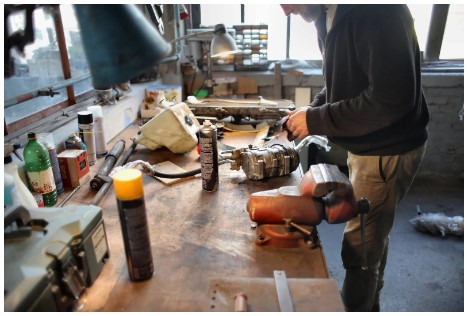Who is a Manufacturing Engineer
A Manufacturing Engineer is a professional who specializes in the design, development, and improvement of manufacturing processes, systems, and production methods. They play a crucial role in the manufacturing industry, bridging the gap between product design and actual production, with a focus on efficiency, cost-effectiveness, and quality.
The main responsibilities of a Manufacturing Engineer typically include:
-
- Process Design and Optimization: They design, plan, and optimize manufacturing processes, ensuring they are capable of producing high-quality products in an efficient and cost-effective manner.
- Production Planning: Manufacturing Engineers determine the most suitable production methods, including selecting the right machinery, tools, and equipment for the job.
- Quality Control: They develop and implement quality control measures to ensure that products meet the required standards and specifications.
- Continuous Improvement: Manufacturing Engineers are continuously looking for ways to improve processes, reduce waste, and enhance productivity.
- Troubleshooting: They identify and resolve production issues and implement corrective actions to prevent future problems.
- Workforce Training: Manufacturing Engineers may provide training to production staff to ensure they are well-versed in the manufacturing processes and equipment.
- Cost Analysis: They analyze production costs, identify areas for cost reduction, and work to improve overall manufacturing efficiency.
- Collaboration: Manufacturing Engineers often collaborate with product designers, research and development teams, and other stakeholders to ensure products can be manufactured effectively.
The role of a Manufacturing Engineer is essential in various industries, such as automotive, aerospace, electronics, pharmaceuticals, and many more. They contribute to the overall success of a company by ensuring smooth production processes and the delivery of high-quality products to the market. Manufacturing Engineers need to have a strong understanding of engineering principles, materials, and manufacturing technologies to excel in their profession.
Relocate to Canada as a Manufacturing Engineer In 2023
Relocating to Canada as a Manufacturing Engineer in 2023 involves several steps and considerations. Canada has several immigration programs that cater to skilled workers, including those in engineering fields. The most relevant program for a Manufacturing Engineer would likely be the Express Entry system, which manages the Federal Skilled Worker Program (FSWP), among other streams.
Here are the general steps to relocate to Canada as a Manufacturing Engineer in 2023:
-
- Determine your eligibility: Check the eligibility criteria for the Federal Skilled Worker Program to ensure you meet the requirements. Factors like age, education, work experience, language proficiency, and adaptability will be assessed.
- Language proficiency: To be eligible, you must demonstrate proficiency in English or French. You can take language tests like IELTS or CELPIP for English and TEF for French.
- Educational Credential Assessment (ECA): Have your educational credentials evaluated by a designated organization to ensure they are equivalent to Canadian standards.
- Create an Express Entry profile: If you meet the criteria, create an online Express Entry profile and provide all the necessary information. Your profile will be given a Comprehensive Ranking System (CRS) score based on various factors.
- Improve your CRS score: The CRS score determines your ranking in the Express Entry pool. You can enhance your score by gaining more work experience, improving language proficiency, securing a job offer, or obtaining additional education or certification.
- Provincial Nominee Program (PNP): Consider applying for a Provincial Nominee Program (PNP) if you have a specific Canadian province in mind. Some provinces have streams tailored to the needs of their labor market, and having a provincial nomination can boost your CRS score significantly.
- Invitation to Apply (ITA): If you have a high CRS score, you may receive an Invitation to Apply for permanent residence during one of the regular Express Entry draws.
- Apply for Permanent Residence: Once you receive an ITA, submit your application for permanent residence within the given timeframe. Ensure all required documents and fees are provided accurately.
- Medical and security checks: Undergo medical examinations and background checks as part of the immigration process.
- Get your PR status: If your application is approved, you will receive your Canadian Permanent Resident status. You and your family members, if applicable, can move to Canada.
Keep in mind that the immigration process can be complex, and it’s advisable to seek professional guidance or assistance from a licensed immigration consultant or lawyer to ensure a smooth and successful application. Immigration rules and policies can change over time, so it’s essential to refer to the official Canadian government websites for the most up-to-date information.
Skills Required to Relocate to Canada as a Manufacturing Engineer
Relocating to Canada as a Manufacturing Engineer requires a combination of technical skills, language proficiency, and adaptability to the Canadian work environment. Here are some essential skills and qualifications that can enhance your chances of successfully immigrating and finding a job as a Manufacturing Engineer in Canada:
-
- Educational Qualifications: A bachelor’s degree in Manufacturing Engineering, Mechanical Engineering, Industrial Engineering, or a related field is typically required. In some cases, a master’s degree may be preferred, especially for more specialized roles.
- Work Experience: Relevant work experience in the manufacturing industry is crucial. Candidates with several years of experience in manufacturing processes, production management, process optimization, and quality control are more likely to be sought after by Canadian employers.
- Language Proficiency: Demonstrating proficiency in English or French is essential for the immigration process. Taking language tests such as IELTS or CELPIP (for English) or TEF (for French) will be required to prove your language abilities.
- Adaptability and Soft Skills: Employers in Canada value candidates who can adapt to new environments and work well in diverse teams. Communication, problem-solving, leadership, and teamwork skills are highly regarded.
- Technical Skills: Manufacturing Engineers should have a strong understanding of engineering principles, production processes, and quality control techniques. Proficiency in computer-aided design (CAD) software, statistical analysis tools, and other relevant software used in the industry is advantageous.
- Knowledge of Canadian Regulations and Standards: Familiarize yourself with Canadian manufacturing regulations, standards, and safety guidelines, as they may differ from those in other countries.
- Continuous Learning: Display a willingness to stay updated on the latest advancements in manufacturing technology and practices. Canada values candidates who embrace lifelong learning.
- Networking: Building a professional network in the Canadian manufacturing industry can provide valuable insights, job leads, and potential employer connections.
- Canadian Certification: Although not always mandatory, obtaining relevant certifications recognized in Canada, such as those from the Society of Manufacturing Engineers (SME) or the Canadian Council of Technicians and Technologists (CCTT), can boost your credibility with employers.
- Express Entry Profile: If you plan to immigrate through the Express Entry system, ensure that your Express Entry profile is well-optimized to improve your Comprehensive Ranking System (CRS) score and increase your chances of receiving an Invitation to Apply (ITA) for permanent residence.
Remember that the Canadian immigration process can be complex, and eligibility criteria may change over time. It’s essential to stay informed about the latest updates from the official Canadian government websites and, if needed, seek advice from licensed immigration professionals to ensure a smooth and successful immigration journey.
Academic Qualifications Required to Relocate to Canada as a Manufacturing Engineer
To relocate to Canada as a Manufacturing Engineer, you typically need to meet specific academic qualifications. Canada has a point-based immigration system called Express Entry, which manages the Federal Skilled Worker Program (FSWP) among other streams. Under the FSWP, your education level is one of the factors that contribute to your Comprehensive Ranking System (CRS) score, which determines your eligibility for immigration.
Here are the general academic qualifications required to relocate to Canada as a Manufacturing Engineer:
-
- Bachelor’s Degree: You must have completed a minimum of a four-year bachelor’s degree in a relevant field of engineering. For Manufacturing Engineering, degrees in Manufacturing Engineering, Mechanical Engineering, Industrial Engineering, or related disciplines are considered appropriate.
- Educational Credential Assessment (ECA): Once you have your degree, you will need to obtain an Educational Credential Assessment (ECA) from a designated organization approved by Immigration, Refugees and Citizenship Canada (IRCC). The ECA is used to verify that your foreign educational credentials are equivalent to Canadian standards.
- Language Proficiency: Demonstrating proficiency in English or French is also crucial for immigration to Canada. You will need to take an approved language test like IELTS (International English Language Testing System) or CELPIP (Canadian English Language Proficiency Index Program) for English, or TEF (Test d’évaluation de français) for French. Your language test scores will contribute to your CRS score.
While having a bachelor’s degree is the minimum requirement, having higher qualifications, such as a master’s degree or a Ph.D., can give you additional points in the CRS and increase your chances of receiving an Invitation to Apply (ITA) for permanent residence.
It’s important to note that Canada’s immigration rules and requirements may change over time, so it’s advisable to refer to the official Canadian government websites or consult with a licensed immigration consultant to get the most up-to-date information before starting your immigration process.
When is the Right Time to Relocate to Canada as a Manufacturing Engineer
The right time to relocate to Canada as a Manufacturing Engineer depends on various factors, including your personal circumstances, career goals, and the current immigration policies. Here are some considerations to help you determine the right time for your relocation:
-
- Job Market Demand: Research the current demand for Manufacturing Engineers in Canada. Look for job openings and labor market trends to gauge whether there are opportunities available for someone with your skills and experience.
- Work Experience: Having relevant work experience can significantly impact your immigration prospects and job opportunities. If you have several years of experience in your field, it may be a good time to consider relocating, as it can enhance your chances of finding employment and obtaining permanent residence.
- Express Entry CRS Score: If you are planning to immigrate through the Express Entry system, calculate your Comprehensive Ranking System (CRS) score. The CRS score determines your eligibility for receiving an Invitation to Apply (ITA) for permanent residence. If your CRS score is competitive, it might be a favorable time to begin the immigration process.
- Immigration Policies: Stay updated on changes in Canadian immigration policies and programs. Immigration rules can evolve, and certain programs may become more favorable or restrictive for certain occupations. Keeping track of policy updates will help you plan your relocation effectively.
- Personal Readiness: Assess your personal readiness for relocation. Consider factors such as family commitments, financial stability, and adaptability to a new country and culture. Relocating to Canada is a significant life decision, so ensure you are prepared for the transition.
- Language Proficiency: If your language proficiency is not at the required level for immigration, you may need to invest time in language training before initiating the relocation process.
- Qualifications and Credentials: Ensure your educational qualifications are evaluated through an Educational Credential Assessment (ECA) to determine their Canadian equivalency. Having your credentials recognized in Canada is vital for the immigration process and job prospects.
- Provincial Nominee Programs (PNPs): Look into Provincial Nominee Programs (PNPs) that may be specific to your occupation or aligned with your experience. Some provinces may have streams designed to attract Manufacturing Engineers, and obtaining a provincial nomination can enhance your CRS score.
Ultimately, there is no one-size-fits-all answer to the right time to relocate. It’s essential to thoroughly research and plan your immigration journey to Canada as a Manufacturing Engineer based on your unique circumstances and goals. If you are unsure about the process or need professional guidance, consider consulting with a licensed immigration consultant or lawyer specializing in Canadian immigration.
Does Canada accept Foreigners as a Manufacturing Engineer
Yes, Canada does accept foreigners as Manufacturing Engineers. In fact, Canada has a high demand for skilled workers, including those in engineering fields like Manufacturing Engineering. The Canadian government recognizes the importance of attracting talent from around the world to support its growing economy and fill gaps in the labor market.
Foreign Manufacturing Engineers who wish to work in Canada have several pathways to do so:
-
- Temporary Work Permits: Foreigners can apply for a temporary work permit to work as a Manufacturing Engineer in Canada. To do this, they will need a job offer from a Canadian employer who is willing to sponsor their work permit application.
- Express Entry and Permanent Residency: Canada’s Express Entry system is a points-based immigration system that manages the Federal Skilled Worker Program (FSWP) among other streams. Manufacturing Engineers with sufficient education, work experience, language proficiency, and other factors that contribute to their Comprehensive Ranking System (CRS) score may be eligible to apply for permanent residency through Express Entry.
- Provincial Nominee Programs (PNPs): Many Canadian provinces have Provincial Nominee Programs (PNPs) with streams that target specific occupations, including Engineering. Some PNPs may have pathways for Manufacturing Engineers, making it easier to secure provincial nominations and permanent residency.
- Canadian Experience Class (CEC): If a Manufacturing Engineer has previously worked in Canada on a temporary work permit, they may be eligible to apply for permanent residency through the Canadian Experience Class, provided they meet other eligibility criteria.
Canada values the contributions of skilled professionals and offers various immigration programs to attract and retain talent. The country’s immigration policies and programs may evolve over time, so it’s essential to stay updated on the latest information from official Canadian government sources when considering immigration as a Manufacturing Engineer.
Canada Application Website for Manufacturing Engineer
there is no specific immigration application website exclusively for Manufacturing Engineers. Instead, the Canadian immigration system operates through different programs and streams that cater to various skilled workers, including Manufacturing Engineers.
If you are interested in immigrating to Canada as a Manufacturing Engineer, the main pathway to consider is the Express Entry system, which manages the Federal Skilled Worker Program (FSWP) among other programs. The Express Entry system is an online application process, and all applications are submitted electronically.
To apply through Express Entry, you will need to create an online profile through the Immigration, Refugees, and Citizenship Canada (IRCC) website. Here are the general steps to apply:
-
- Check your eligibility: Ensure you meet the eligibility criteria for the Federal Skilled Worker Program (FSWP). Factors such as age, education, work experience, language proficiency, and adaptability will be considered.
- Create an Express Entry profile: Go to the official IRCC website and create an Express Entry profile. Provide accurate and complete information about your qualifications, work experience, language proficiency test results, and other relevant details.
- Get your Comprehensive Ranking System (CRS) score: Based on the information you provide in your profile, you will receive a CRS score, which ranks you against other candidates in the Express Entry pool.
- Improve your CRS score: If your CRS score is not high enough to receive an Invitation to Apply (ITA) for permanent residence, consider ways to improve it, such as obtaining a higher language test score, gaining more work experience, or obtaining a provincial nomination.
- Receive an Invitation to Apply (ITA): If your CRS score is high enough, you may receive an ITA during one of the regular Express Entry draws.
- Submit your application: After receiving an ITA, you will have a limited time to submit your complete application for permanent residence online through your Express Entry account.
- Medical and security checks: Undergo medical examinations and background checks as part of the immigration process.
- Get your PR status: If your application is approved, you will receive Canadian Permanent Resident status.
Please note that immigration rules and procedures can change over time. Always refer to the official Immigration, Refugees, and Citizenship Canada (IRCC) website for the most up-to-date information and instructions on how to apply for immigration to Canada as a Manufacturing Engineer.



